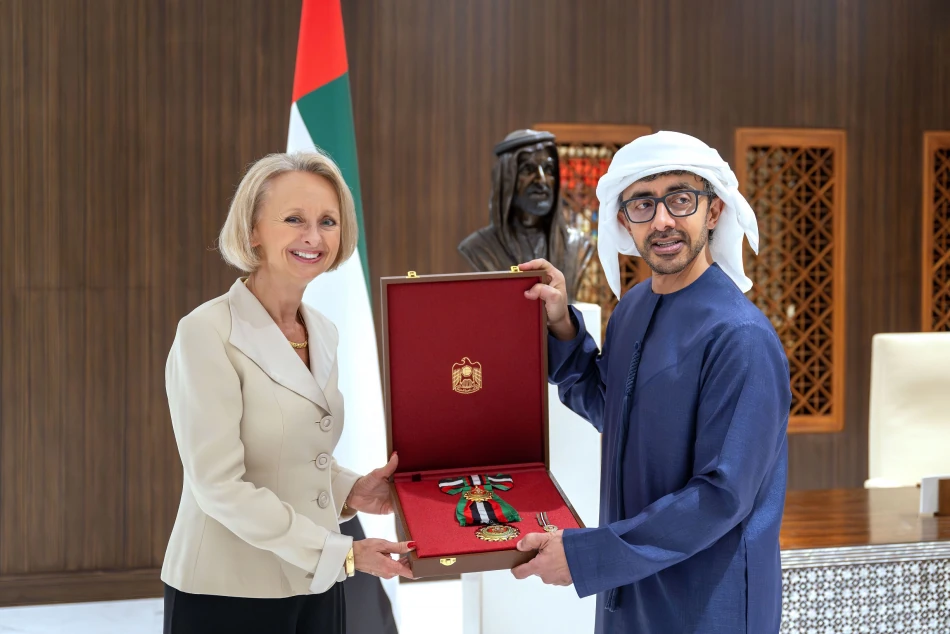
UAE President Bestows Zayed Order of the Second Class on US Ambassador
UAE Awards Top Honor to Departing US Ambassador, Signaling Deepening Strategic Partnership
The United Arab Emirates has awarded its highest diplomatic honor to outgoing US Ambassador Martina Strong, underlining the growing strategic importance of UAE-US relations at a time when Gulf partnerships are reshaping global economic and security dynamics. The Zayed Medal of the First Class represents more than ceremonial recognition—it reflects the UAE's calculated investment in maintaining privileged access to American markets, technology, and security cooperation.
A Strategic Recognition Beyond Protocol
Sheikh Mohammed bin Zayed Al Nahyan, UAE President, granted Ambassador Strong the Zayed Medal of the First Class in recognition of her efforts to strengthen bilateral ties across multiple sectors during her tenure. The award was presented by Sheikh Abdullah bin Zayed Al Nahyan, Deputy Prime Minister and Foreign Minister, during a ceremony in Abu Dhabi.
This level of recognition is rarely bestowed on departing diplomats and signals the UAE's satisfaction with the trajectory of bilateral relations under the Biden administration, despite initial concerns about America's Middle East pivot toward Asia.
Economic Implications for Regional Power Dynamics
The timing of this honor coincides with the UAE's emergence as a critical hub for US economic interests in the region. Trade between the two nations exceeded $31 billion in 2023, with the UAE serving as America's largest export market in the Middle East. The relationship has proven particularly valuable in sectors ranging from renewable energy partnerships to advanced technology transfers.
Investment and Market Access
For investors and multinational corporations, the strengthened UAE-US relationship creates significant opportunities. The UAE's position as a gateway to African and South Asian markets, combined with preferential US trade treatment, offers companies unique advantages in supply chain diversification strategies.
The diplomatic recognition also suggests continued US support for UAE financial institutions' global expansion, particularly important as Dubai and Abu Dhabi compete with Singapore and Hong Kong as regional financial centers.
Comparative Regional Strategy
Unlike Saudi Arabia's more complex relationship with Washington, marked by tensions over oil policy and human rights concerns, the UAE has maintained remarkably consistent diplomatic momentum. This approach mirrors Singapore's successful strategy of leveraging strategic partnerships to punch above its economic weight.
The UAE's diplomatic investment in US relations contrasts sharply with other Gulf states' hedging strategies between American and Chinese partnerships. While Kuwait and Qatar maintain more balanced approaches, the UAE appears to be doubling down on Western alignment, particularly in technology and financial sectors.
Looking Forward: Strategic Implications
Ambassador Strong's recognition reflects successful navigation of complex regional challenges, from Iran tensions to the normalization of relations with Israel through the Abraham Accords. Her tenure coincided with increased US-UAE cooperation on regional security issues and joint initiatives in emerging technologies.
The award suggests continuity in bilateral relations regardless of potential changes in US administration, providing reassurance to businesses and investors planning long-term regional strategies. For the UAE, maintaining privileged access to US markets and technology remains essential to its economic diversification goals beyond oil dependency.
This diplomatic milestone reinforces the UAE's position as America's most reliable Gulf partner, with implications extending far beyond ceremonial recognition to concrete advantages in trade, investment, and regional influence.
Most Viewed News

 Sara Khaled
Sara Khaled






